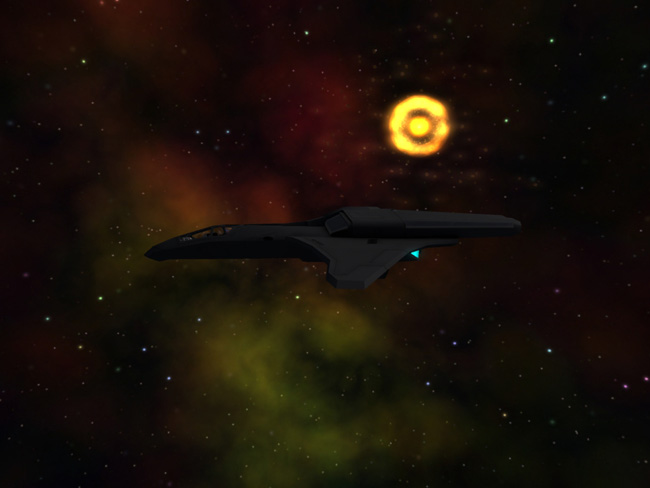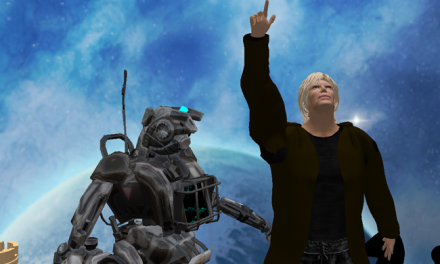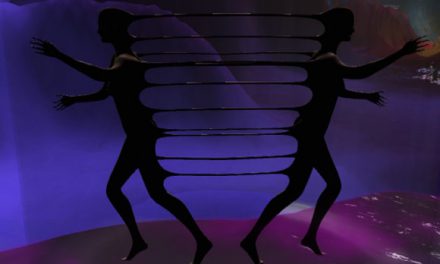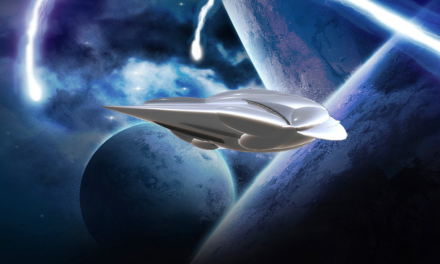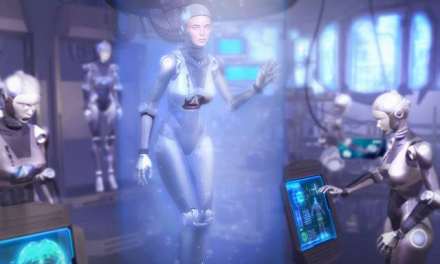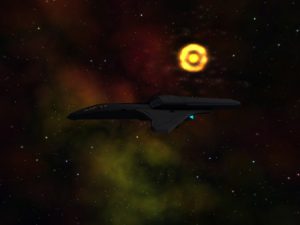 “Imago et Umbra”
“Imago et Umbra”
by
Hristo Goshev
Strain as I might to make out anything in the darkness stretching before me, it remains as uniform and impenetrable as ever. Space always looks strikingly gorgeous when viewed from an observatory or as a digital projection, but from the cockpit of a fighter, that’s another story. The vibrant nebulae and radiant quasars vanish, replaced by a bottomless abyss with but a few tiny dots of light to disrupt its homogeneity. This no longer disturbs me—at least not like it did while I was still a cadet at the Deneb Military Academy a lifetime ago—but it still feels a bit unfair. Pilots deserve some of that magic too.
I turn to the left to look for my wingman, and one of the safety belts digs painfully into my shoulder. As far as we know, this is the first field deployment of the Aurora-class craft, a multipurpose interceptor packed with the most advanced radar tech and armaments known to man. On paper, it’s a great piece of hardware, but there’s still a lot more to be done for the comfort of its operator. I make a mental note to put this in my report when we return to base.
We’re on a recon mission in Ross 128—the place where humanity’s grim odyssey began even before I was born. The briefing was vague, almost obscure: the Union’s installation Riviera 2 had picked up signals of undetermined origin in the system’s outskirts, and it was up to us to investigate them. Apparently, even the slightest chance of encountering the Destroyers is enough to make the old men in Command crap themselves in fear, so here we are, wasting taxpayer credits on a wild-goose chase. But I don’t mind. I’d take the most boring mission over spinning in the simulator with a bunch of academy-fresh punks who can’t get on my six even after a dozen attempts. And if we run into something to shoot at, all the better.
Being a soldier in peacetime is like suffering heatstroke midwinter: everyone wants to help you, but they’ve no idea what’s wrong. Sure, there are always rookies to train, new ships and weapons to master, joint exercises to carry out with our allies; we don’t twiddle our thumbs all day long. But to someone who’s fought in a full-scale war, someone who’s seen thousands of lives extinguished in seconds, all of this is just a vapid interlude before the next major act. You hope it never comes, but deep down inside you feel that it’s inevitable.
It’s been four years since the Capella apocalypse when humanity nearly lost it all. We barely managed to hold the enemy back in that hurricane of madness and fire caused by the death throes of a wrathful sun: a Pyrrhic victory at the cost of millions of lives. The Destroyers vanished without a trace, leaving us to guard our stellar mausoleum in constant, tense anticipation of their return. All subspace nodes to their territories were sealed, but that’s hardly a source of comfort. One should expect anything of a species capable of making a star implode within mere hours.
“Nick, will you wake up already?” Max booms over the intercom, breaking my daze. “I’m starting to feel like I’m talking to myself here, and that doesn’t bode well for one’s mental state, does it?”
I let out a shallow sigh. “No names, you moron! Did you forget what they told us at briefing? Or is a covert op the same to you as bed talk with your wife?”
“Don’t get your britches in a bind, Alpha One.” He accentuates the designation in an obvious mockery of Fleet comms protocol. “No one can hear us out here. The closest relay station is light-hours away, and we’re on an encrypted channel.”
“Have I ever told you that you’re my punishment, Ursa? You’ve got the terrible inclination to think only when you really shouldn’t.”
He doesn’t retort, but his shaking helmet in the lower-right corner of my Heads-Up Display indicates that he must be laughing his ass off while muted. Max can act like an irresponsible kid at times, but he’s a great pilot and an even better friend, and I wouldn’t trade him for all the model officers heading the charts of the four Terran fleets.
“You don’t expect us to find any of them in this wilderness, do you, Ghost?” he mutters after a brief silence.
“You know as well as I do that that’s impossible. At most, we could come across the remnants of some Great War relic or another.”
“Then, why send us here? The Special Operations Committee surely has more experienced scouts. We’re fighter pilots, Destroyer-hunters!”
“Again, stop trying to rationalize. Leave that to smarter people like your wife. We’re here to do a certain job, then jump back to our ship and get drunk with the rest of the boys. Nothing more and nothing less.”
“But why are we hiding even from our reptile friends?” he persists. “Why doesn’t Command want them to know that we’re sniffing around here?”
“See these Admiral marks on my shoulder, Ursa? Yeah, me neither,” I snap at him. “If it makes you feel any better, I’m not ecstatic about being here either. Now let’s just shut up and get this over with. We’ve only got forty-eight klicks to the next waypoint.”
Before he can bicker further, I step on the thrust pedal and lead my fighter toward the navigation marker, outlined with green contours on my HUD. Trying to figure out Command’s motives is a task I’ve long since given up on. And even if I could, what good would it do? In the worst-case scenario, if they really turn out as nefarious as some claim, I can picture myself plotting an attempt on the secretary general’s life during one of his planned tours.
As I concoct the perfect plan for a political assassination just to stave off boredom, the flight computer sends a series of abrupt signals into my headphones, letting me know that the Aurora’s sensors have detected a subspace field. It’s weak and inconsistent, but its intensity grows as we approach our goal. There should be nothing like this here at the system’s edge, with both of its subspace nodes equally farther away.
An indistinct, dizzying agitation rises in my stomach, and it takes me a few seconds to recognize it. That same feeling of unreality took hold of me several times during the war—the premonition that I’m about to encounter something that was never meant for me or for any other human being. My fingers instinctively grip the control stick with unexpected force, and cold moisture runs down my neck. It’s as if some invisible watcher has suddenly fixed their all-seeing gaze on me: an evil entity waiting for the slightest misstep on my part in order to crush me into oblivion.
I’m just about to arm my fighter’s weapons, when its IFF subsystem tells me that it has picked up a friendly configuration on radar. A moment later the optics screen in my cockpit shows the unmistakable outlines of an Orion-class destroyer drifting in the void.
#
“Which ship is this, Ghost?” Max fusses in my headset as we draw near it. “The Union has no destroyers in this system. Hell, there should be no ships here at all, save for a couple of unmanned science vessels!”
Instead of speculating, I engage the afterburner and circle around the two-kilometer mastodon until I reach its bow and illuminate it with my floodlights. The inscription has been partially erased by bomb hits, but my eyes widen as I make it out. It’s the Bastion—the Union’s best ship from thirty-seven years ago. The thing is, this ship can’t be here…or anywhere else.
In the last days of the Second Incursion, Terran Command turned the aging Bastion into a giant meson bomb to seal one of Capella’s subspace nodes. None of us saw the explosion: what takes place in subspace can’t normally be detected from outside without specialized equipment. But the tunnel did collapse. The Bastion saved us from extinction for the second time.
What I’m seeing shouldn’t be possible, yet my ship’s sensors confirm it beyond a shadow of a doubt.
“Terran destroyer, this is Alpha One of the 222nd Squadron.” I try raising them on the standard Union frequency. “Do you read? What’s your status?”
As I wait for an answer, I can’t stop wondering what must have happened to this ship and how it has ended up here, in this remote system. What kind of force could have saved it from certain annihilation and then carried it to the other end of colonized space, unbeknownst to the Union’s military? Is this even the same Bastion? And if it is, how has it survived on its own for so long?
“Ghost, how do I know we’re not hallucinating right now?” Max asks, his bird already in tight formation behind mine. “Because it’s either that, or we’re witnessing Command’s most expensive practical joke since the Colossus.”
“I don’t know, Ursa. I’ll try them again. You get in touch with Command and ask for instructions.”
“About that… I’ve been trying for a while, but I’m picking up zilch on the subspace channel. Relay station Riviera 2 won’t respond either. My EWAR module isn’t reading any jamming, though. It’s more like nobody’s listening.”
I want to tell him to stop acting crazy and check his systems, but mine report the same results. Even my hails on the emergency SOC channel meet only a chilling stillness. None of it makes any sense. Were this a training exercise, I could assume that Command was deliberately testing our reactions in an aberrant situation. But we’re on a real mission, a highly classified one at that, and our military intelligence isn’t known for its sense of humor.
“Ursa, jump back and report to Command!” I finally instruct my wingman. “I’ll hold position and monitor events.”
“I don’t like this one bit, Ghost. We have to stick together, not split up. What if….”
He doesn’t finish the thought, but I can guess how it could have ended. What if something jumps out of subspace the moment one of us departs? Or what if that same thing is waiting for us in subspace like some antediluvian predator, starved for millennia, which only now has smelled fresh prey? Fleet never taught us to think like this—undisciplined, paranoid, cowardly—but at the end of the war, I saw things that good old Instructor Wu could not have envisioned, even in his most grotesque nightmares. Once you obtain this perspective, sorting experiences into the same clear-cut categories as before is no longer possible.
“No, I’m not leaving you alone with this ghost ship!” Max protests in a shaking voice, and I can’t tell if it’s anger or panic that fuels it. “Who knows what perils could be lurking about!”
“Get a grip, will you!” I quickly dismiss his concerns, trying to hide my own growing fear behind the mask of rationality. “This isn’t one of your grandmother’s tales. There’s nothing supernatural at work here. We’re riding prototypes that are prone to all sort of technical defects, remember? Go back to Delta Serpentis and call for an extraction team. I can take care of myself for a few minutes, believe it or not.”
“But that’s not all there is, is it? What do you hope to find here? This ship is only a shadow, a phantasm, some foul product of our subconscious! It’s no miracle left by the cosmic gods just for you!”
“Max, shut the—”
“All the girls in Fifth Fleet are dead keen on you, as are many of the guys!” He continues shouting over me, his face twisted with emotion. “When will you stop chasing her phantom? It’s been four years, dammit! She’s dead and she’s not coming back, no matter how much you, I, or the whole universe wants it! You’re not honoring her memory by plunging into the darkest corners of space and playing Russian roulette against fate!”
“Alpha Two.” I summon all of my willpower to resist the urge to burst out. “Let me remind you that I’m the ranking officer on this mission. I gave you a direct order to reestablish contact with Command via a jump to Delta Serpentis. Now, execute!”
“Idiot,” he grumbles as his exhaust nozzles flare up. “Don’t you dare get killed!”
I keep staring after my friend’s fighter even after it vanishes in a funnel of blue light. He’s not wrong. After Capella my life became a string of still images I’ve been apathetically passing through, like a ship on autopilot that follows its course efficiently, but without any real sense of purpose. It’s incredible how a single person can imbue your existence with so much meaning—or take it away.
If only self-pity could accomplish missions. I approach the ancient destroyer’s hulking frame and start scanning its subsystems from a hundred meters away. They’re all shut down, but at least the hull still appears airtight. No emissions come off it, though, nothing to indicate any sort of activity on board. If nothing else, we may have found a real-life model of a fabled ship, produced by some gargantuan molecular printer. I’m sure that Max’s wife, Mina, with her scientific obsession with inexplicable phenomena, would find this rather fascinating. During the war, she often shared with us her theories on divergent space-time planes arising from a common subspace manifold. Now I wish I had paid more attention to her lectures.
As I brood over the nature of reality, the landscape’s deceptive tranquility is suddenly shattered. The radar screen in my cockpit flashes a couple of times, signaling an incoming subspace transit, and then the alarm goes nuts.
#
I have two bogeys heading straight for the Bastion. The computer identifies them as Dragon-class fighters—the Destroyers mainly use them for long-range reconnaissance, but they can be a real nightmare in a dogfight, especially in large numbers. Then it occurs to me that this is the Union’s first encounter with our nemesis since Capella. So much for being safe after sealing the lost system’s subspace exits.
I’m surprised at how calmly I’m taking this, unlike my flight computer which tries to bury my senses under a mountain of warnings and tactical options. I know these by heart—hell, I came up with many of them during the Second Incursion. The enemy clearly sees me, so instead of waiting for them to come at me from two fronts, I engage my thrusters and head for them. I see them split up, attempting a feint, but they don’t know that my bird packs a third-gen particle accelerator with a two-klick range and twice as powerful as anything we had four years ago. I’m still accelerating toward them when my cannons spew out their fiery tongues, slashing space with a blinding arc of superheated matter. The first target blossoms in an orange flower of debris and glowing gas. The other one has swung around and coming up on my six, going for an aspect lock, but that just won’t fly.
I give it two more seconds to close in and then cut my afterburners, simultaneously engaging full reverse thrust and flipping my fighter along its lateral axis. It suddenly feels like a giant invisible hand is trying to push me out through the armored canopy. My vision goes red, but I will myself into staying conscious as my pursuer overtakes me. This makes the twelfth successful cobra in a row. I think of Dad and how he would be proud that I’ve matched his record while my shots tear through the Dragon’s shield and fuselage. I’ve barely had time to catch my breath, when the radar gives off another disgruntled beep, and my HUD turns red again.
So, they’ve managed to call in reinforcements.
Three klicks away from my position, subspace spits out four Basilisks, tactical superiority fighters that are slower and less maneuverable than mine but can carry heavier armament. Without waiting for radar lock, they fire a volley of missiles at me. So be it—I’ll improvise. Trying to keep the fast projectiles at a right angle while narrowing the distance to my targets, I flood my flight path with decoy flares. The accelerometer claims that I’m pushing 11 g, but I’ve endured much worse.
As the incoming-missile alarm dies down, I cut into the enemy formation, forcing them into a knife fight. It’s only now that I’m able to survey their insectoid hulls of red-and-black metal, menacing shapes that have thrown many a pilot into the embrace of terror. When I first saw them, years ago, they looked to me like servants to some ancient and mute god that seeks the end of all sentient life. Now they’re just another item on the kill list.
My shield starts absorbing hits, but I ignore them as my cannons rip one of the Basilisks to shreds. I’m flying through a storm of crimson drops, which somehow reminds me of the summer festivals on Deneb E—spectacular fireworks blooming over me and Jen as we dash along the wide, decorated streets with Mom and Dad following in tow. It feels weird to think of the home I haven’t visited in years, while fighting in this desolate waste. It suddenly occurs to me that I might never see it again, and the sharp pain in my chest startles me more than the aspect lock alarm.
Why am I risking my life to protect this lifeless husk? I don’t know. Something inside me simply refuses to abandon a Terran ship to the enemy, especially the ship my dad served on throughout most of his military career. Even so, I don’t know much more about it than any other Fleet officer. Dad never talked a lot about the Great War or his role in it, and it took me quite a while to figure out his reasons. War turned out anything but the glorious endeavor our government’s propaganda made it out to be. Taking part in actual combat encumbers you with a ton of emotional baggage that would be unfair to dump on other people, least of all your relatives. I should know.
My eyes, hands, and feet perform the deadly dance almost automatically. My Aurora outruns another enemy fighter, catching it off guard in the middle of a rolling scissors. The two that remain shift their angle of attack in an apparent attempt to pincer me in a loose deuce—a smart tactic when outnumbering a more maneuverable target. I immediately go for a break turn, bleeding momentum, but midmaneuver I engage full burners and extend out of the enemy’s kill zone.
That’s when my AGSM training fails me. No matter how rapidly I breathe and compress my muscles, the enormous acceleration starts draining my brain of blood, constricting my vision to a shrinking circle. Sensing the impending G-LOC through my flight suit’s telemetry, the Aurora’s medical system injects me with a massive dose of adrenaline. My heart starts racing, threatening to burst out of my chest, but my sight recovers—and just in time. I have a firing solution on one of the Basilisks, before its partner can catch up with me. All of my four cannons thunder as one, turning it into radioactive scrap. The last one tries to shake me, but in a one-on-one fight, it stands no chance.
For the third time, my instruments pick up an incoming jump configuration. Knowing the Destroyers’ attack patterns, this should be their last and strongest push. My experience proves correct: I’m dealing with a full wing of eight, including two heavy bombers. Odds like these would give pause even to the most confident of aces. I shouldn’t have listened to Max and left the advanced combat drugs I purchased in Vega back at base.
Rage burns up in my veins—rage against the enemy’s unpredictable, wanton acts of barbarity, against Command’s clandestine motives, against my own shortsightedness. But I have no time to analyze or regret. I launch all of my remaining missiles at the clump of enemies in an attempt to scatter their formation. It works only partially: one of the bogeys erupts in a bright explosion, and two more break away, but the rest press on toward the Bastion.
I’ve felt helpless many times in my life: I’ve been outnumbered, outgunned, and outmaneuvered; I’ve seen my compatriots being slaughtered like cattle; I’ve witnessed the death of an entire star system. But I’ve been reduced to utter despair only once, when another life was snuffed out instead of mine, the life of the person I had dedicated myself to. What I’m facing now is nothing compared to that agony.
The countermeasure blasts merge into an infernal blaze that burns my eyes. Breathing has become a painful task that I perform with dogged determination. My fighter dashes and rolls like a wasp on speed, and a part of me wonders if it ever occurred to its designers to test it for such abuse. In the crossfire that has ensued, the enemy is dealing more damage to themselves than to me, but that doesn’t make the outcome any less inevitable.
I’m wasting energy just to stay alive for a few seconds longer. Advanced as it may be, my bird’s meson reactor struggles to power the overloaded propulsion, defensive, and weapons systems. My shields are now gone, and the Aurora’s armor has taken a few plasma shots and won’t withstand many more. Under any other circumstances, I would have ejected by now, but the Destroyers have no regard for capitulation or POW rights. I might as well take down as many of them as I can.
Suddenly, an enemy fighter explodes behind me, then another one. A quick glance at the radar tells me that I’m not fighting alone anymore: an undesignated unit is covering my six. I’m somewhat impressed that its pilot can keep up with me as I desperately charge through the enemy’s ranks—few have been able to, even in training. During my next half-roll, I catch a brief glimpse of my savior. It’s a Perseus-class interceptor, successor to the legendary Valkyrie and precursor of the ship I’m flying in. It must have launched from the Bastion’s hangar while I was busy fending off the attackers.
It’s almost uncanny how well my mysterious wingman matches my flying style, and without any verbal coordination. They draw the enemy’s fire when I press for a kill, then go on the offensive while I replenish my energy and manage to maintain formation even during my most extreme aerobatics. The Destroyers try to wear us down with their numbers, but the tactical advantage gradually shifts in our favor. Then, in an instant, it’s over. A strange silence falls over the battlefield, and my ship goes into self-repair mode. I feel like I’ve been fighting for hours, but my flight computer indicates that it’s only been a few minutes.
“Unknown Terran fighter, identify yourself!” I hear someone hail me on one of the Union’s standard channels.
It’s a young woman’s voice.
#
Before I can comprehend why, my pulse starts banging in my eardrums, my breathing grows faster, and my head feels as if it’s full of lead. Then it dawns on me: I know that voice. Hearing it here and now is beyond impossible, and yet… No. I must have imagined it. That must be it. Perturbed by the hypoxia, the adrenaline overdose, and the nonsensical situation I find myself in, my brain has manufactured some abstract association.
“This is Captain Nicholas Carter of the 222nd Nightwolves, Fifth Deneb Fleet,” I respond cautiously. “Who do I owe my thanks to?”
“A pleasure to meet you, Captain. I’m Flight Lieutenant Shannon Casey of the 70th Blue Lions, Fourth Fleet Vega. I never expected to find other Terran forces in this system. We gave them hell, didn’t we?”
I want to argue with her that the 70th Terran squadron has long since been disbanded, but something tells me that it’s pointless to do so, that she’s just as convinced in her truth as I am in the absurdity of what’s happening. Instead, I only manage to croak out a few words, each burning my throat as if I’m swallowing live embers. “Is that your full name, Flight Lieutenant?”
She remains silent for several seconds, and when she finally speaks, there’s a tinge of astonishment in her voice. “Well…there’s this Margaret in the middle, but frankly, I’ve never cared too much for it. Imagine the irony: my parents went to all the trouble of coming up with this long, old-fashioned name, only to abandon me a few months later. But how did you know to ask?”
It feels like the universe is playing a sadistic joke on me. The helmet hides most of her face, but her eyes… I’d recognize those sparkling emeralds anywhere. She obviously doesn’t know me—the man she shared everything with for five months, the man who got her killed in the last moments of the war. She sounds like her, looks like her, even bears the same name and has the same history… but she’s not my Shannon.
“Just a hunch,” I answer after what could have been an eternity. “You remind me of a friend I once had.”
“Are you all right, Captain Carter? You sound upset.”
“Not your fault.” My helmet suddenly feels stifling, and after a brief struggle with its buckles, I take it off and secure it onto the ejection seat.
“Handsome, are we?” she chuckles, and her eyes glisten in that wonderful, cunning way I know so well. “Are you trying to hit on me, pilot?”
“What if I am?”
“Let’s see… I’d gladly give you a tour of our great mothership, but I’m afraid she’s not terribly welcoming right now. So, we’ll have to spend our date in open space, chasing each other down.” She pauses and then, after a moment of hesitation, adds, “I know I’m breaking protocol, but can I call you Nick?”
“Sure, Shannon. That’s what wingmen do. And you did save my ass.”
“That I did.” Her soft, muted laughter fills the intercom, and then a comfortable silence settles over us, the type only old friends can share. I’m just about to ask her how she ended up in this mess, but she gets ahead of me. “Sometimes I wonder why we’re even here, why we’re doing all this. What is it that drives us to push ever farther, to explore and to colonize, to fight and to reshape entire worlds? And when we’re blown to atoms, is there anything after? Some place where we can be reunited with the ones we hold dear?”
“I don’t know… but it sounds wonderful,” I force myself to answer, even if I don’t believe in the idea. If I did, I would have offed myself a long time ago.
“Weird, isn’t it? We just met, and I’m babbling like an overclocked android. I hope I’m not creeping you out.”
“You couldn’t if you tried.” I blush like an idiot even as I say it, and I’m sure she notices. But then again, she always could make me act like this.
“You’d be surprised.” She winks at me through the intercom as her fighter rocks its wings vigorously, like a shaggy dog shaking water off its coat.
I feel like laughing and crying at the same time. Is this what madness is like? Talking to my dead girlfriend’s ghost makes me feel more at ease than anything else has over the past several years. I half expect to wake up in a psych ward, surrounded by worried faces, but nothing of the sort happens. Right now, the whole universe consists of me, her, and the Bastion’s shadow. I suspect that even if I try to jump away in subspace, I’ll end up here again, but there’s nothing alarming about that prospect.
“What do you dream of, Nick?” Shannon asks out of the blue, her gaze piercing through me.
“Nothing, really. I haven’t in a long time.”
“I don’t believe you.” She slowly shakes her head, squinting her bright green eyes. “Everyone dreams of something, even if they don’t realize it or don’t want to admit it. I think you long for a soul mate, someone to understand you like your lost friend did. And I think you’ll find them sooner than you might expect.”
“So, everyone is replaceable, is that it? You don’t believe that there’s a perfect match for each of us, someone to make us whole and complete?” I notice that I’ve been shouting only after I run out of breath, but she doesn’t appear offended by my outburst. If anything, her voice grows even tenderer than before.
“Oh, I do. But even if you were the one for her, that doesn’t necessarily mean she was the one for you.”
“How could it be anyone else, if I miss her every second?” I whisper, a drizzle of warm liquid trickling down my cheeks.
“I’m sure she would be very happy to hear that. But if she cared for you as much as—”
The radar’s angry whine cuts her off as a telltale flash of azure flickers in the distance. My heart sinks down to the Aurora’s fuel tanks when I see the enemy’s configuration: a Demon-class destroyer with full fighter escort. This time they’re out for blood.
“I think we’ve overstayed our welcome,” Shannon sighs, but there’s no trace of fear in her expression. “I’m grateful for your help so far, but this is not your fight. They’re here for us.”
“You don’t have to face them alone,” I start arguing, but she only shakes her head and smiles.
“Go back to where you belong, Nick. Someone is waiting for you out there. Even if you don’t know them yet, someone needs you, and you need them. So, go. Find them.”
I want to respond, to tell her so many things, but without warning, the Bastion activates its engines and plunges into the depths of subspace along with the small Perseus. The Demon and most of its entourage quickly follow in pursuit. My whole being aches to rush after them, but a small voice in my head tells me that I shouldn’t, that they’re not actually going anywhere, that all of this may have been just my mind trying to find closure, some release from the vicious cycle of despair, loneliness, and guilt. A way out through my last conversation with her that we couldn’t have back then. Maybe I’ll never find out, and maybe it’s better this way.
The few remaining stragglers head for the only Terran craft left in the sector—mine. They’re six klicks away and closing fast, but my shields and weapons are now fully charged. The targeting computer starts drawing lead indicators for each of the bogeys on my HUD. I put my helmet back on and fasten its buckles.
Five thousand meters.
I throw one last glance at the patch of space that swallowed the phantom ships. The weight in my chest won’t go away, but it’s no longer the same suffocating anguish that haunted me ever since Capella. Now there’s something else that I can’t quite name—a blend of bittersweet longing and anticipation, like in the moments before sunrise after a long winter night.
Four thousand meters.
Without her, I had nothing to live for—or so I kept telling myself over those four endless years. But I made it through because of all the people who were there for me, the people I now yearn to see again. Dad back in Deneb. Max and Mina. The guys of the 222nd. I can’t afford to die here. There’s so much I have to tell them. So much I have to give back.
Three thousand meters. A moment more, and they’ll be in my cannons’ effective range. My right foot slams the thrust pedal down. I grin and squeeze the trigger.
